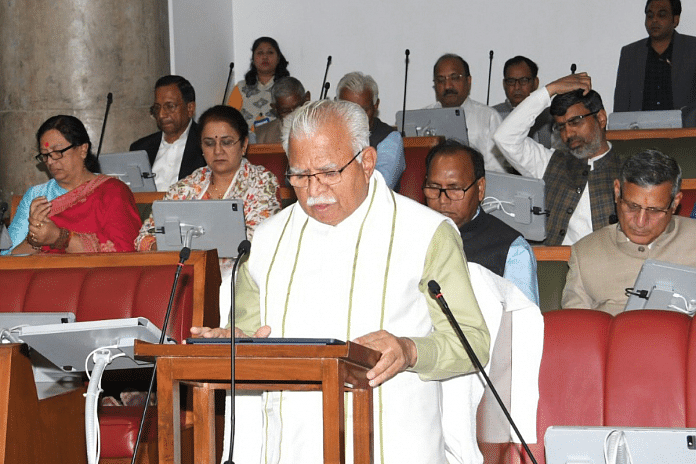Chandigarh: Come Monday, Haryana legislators will have to attend a training session on understanding the nuances of the Budget.
The one-day session, a first-of-its-kind initiative that Haryana Speaker Gian Chand Gupta has organised for the 90-member assembly, will have trainers from the Parliamentary Research and Training Institute for Democracies (PRIDE).
All members of the House, including the chief minister and the deputy chief minister, will attend the training session.
PRIDE is an institution under the Lok Sabha Secretariat that was set up in 1976 with the explicit purpose of training MPs on parliamentary procedures and systems.
The session comes days before the assembly debates the Budget, which Haryana Chief Minister Manohar Lal Khattar tabled last month.
Speaker Gian Chand Gupta said the session was organised to spur constructive debate on the Budget.
“This is a fact that most of our legislators are not conversant with the nitty-gritty of the Budget and the terminologies used in it,” he told ThePrint. “I noticed that every year, the Budget was being passed without any constructive debate on it. During the discussions on the Budget, most of the legislators would speak on infrastructure projects needed in their constituency.”
The Haryana Budget Session for 2023 has been divided into two parts. The first part was from 20-23 February, when the Budget was tabled. The next phase will be from 17-22 March.
The development comes a year after the speaker announced standing committees for budgets.
Much like the Parliamentary standing committees, these panels will study the Budget closely and submit their reports before the second half of the session begins on 17 March.
“For the first time last year, I constituted eight standing committees of the MLAs by dividing the demands for grants into eight thematic areas for the scrutiny of the Budget on the lines of the Parliament. They will study the Budget closely and submit their reports before 17 March, when the House meets again for the second phase of the Budget session,” Gupta said.
Seventy-four of the House’s 90 members — both from the ruling Bharatiya Janata Party-Jannayak Janata Party coalition as well as the Opposition — are in the standing committees.
The committees have been constituted under Rule 190 (b) of the Rules of Procedure and Conduct of Business in the Haryana Legislative Assembly, Gupta said.
Also Read: Why Haryana Opposition is demanding local development fund for MLAs — ‘officials reject projects’
Many firsts under Speaker Gian Chand Gupta
The training session was a result of the letter Gupta wrote to the Lok Sabha. In the letter, he said that the standing committees were finding it difficult to function and required training to understand the nuances of the Budget.
“The Lok Sabha has accepted the request of the Vidhan Sabha Secretariat and has agreed to send its team. The team includes Vinod Kumar Tripathi, a former joint secretary of Lok Sabha, C. Kalyanasundaram, director of Lok Sabha, and Uttam Chand Bhardwaj (additional director at Lok Sabha),” Gupta told ThePrint.
Varun Chaudhary, the Congress MLA from Mullana, welcomed the development.
“This is the first time that the assembly will have standing committees like Parliament. The orientation will definitely help us understand how such panels function in the Parliament,” he told ThePrint.
There have been several such firsts in the assembly ever since Gupta became the Haryana speaker in 2019. Last June, Gupta set up a protocol committee to help rein in any “discourteous and contemptuous behaviour” by civil servants towards MLAs.
In December, the panel summoned three officials of the rank of additional chief secretary after their departments refused to provide answers to some questions posed by MLAs.
Rule 45-A of the Rules of Procedure and Conduct of Business in the Legislative Assembly makes it mandatory for government departments to reply to the MLAs’ questions within 21 days.
“The committee has been constituted under Rules of Procedure and Conduct of Business in Legislative Assembly, and it recommends action against the officials after examining their behaviour. Though the Assembly had a privilege committee, the complaints of disdainful behaviour of officials towards MLAs were not covered under it, and hence the officials went scot-free despite complaints,” a Congress MLA told ThePrint.
In another first, Gupta also ensured a regular Zero Hour — the time that elected representatives are allowed to raise questions in the house.
“Earlier, there was no fixed time for Zero Hour in the Haryana assembly. If a legislator had an issue, he or she would raise it and the Zero Hour would end immediately. Now, we have a fixed one hour for the Zero Hour,” the MLA said.
In addition, the assembly now has a draw of lots for Zero Hour in order to ensure that all legislators are given equal opportunity to speak.
(Edited by Uttara Ramaswamy)
Also Read: Independent body likely to lose power to probe ‘attempt to rape’ cases against Haryana cops



